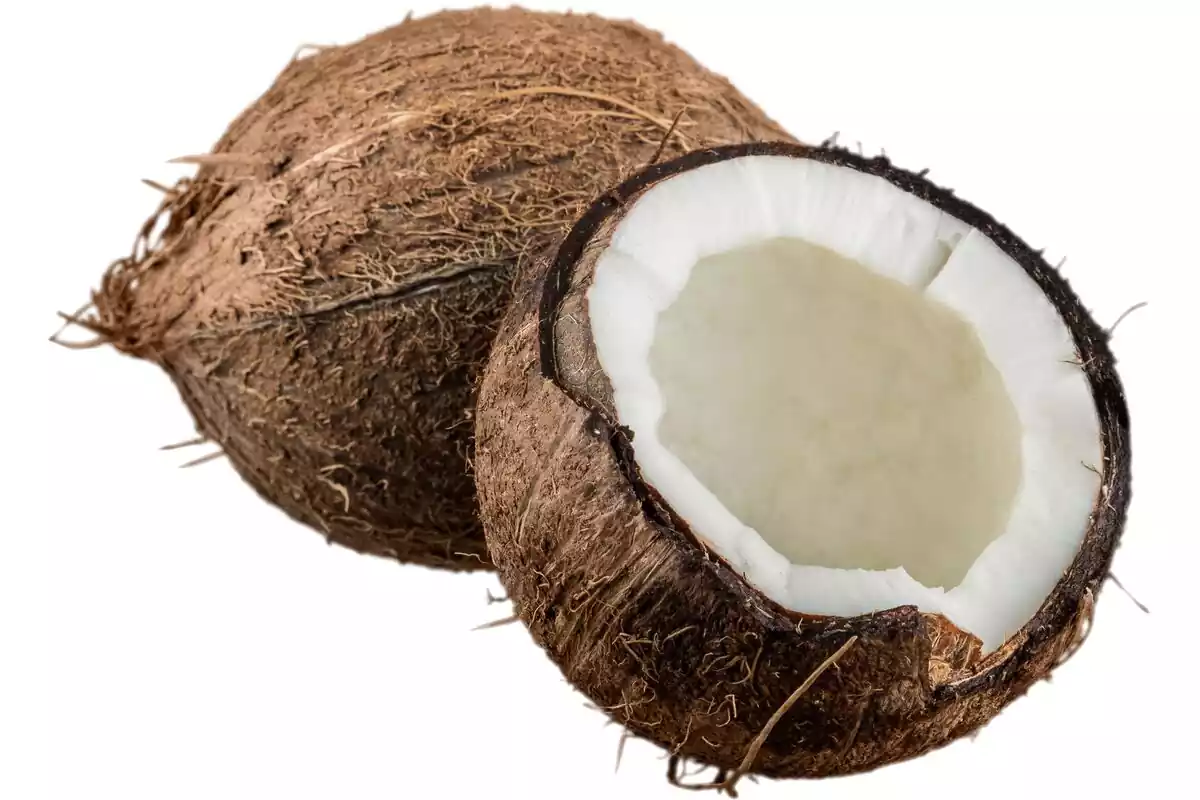Lately, everyone wants to know: is coconut oil good for you? How can you use it? These days it seems like there are always new 'superfoods' popping up on the market.
The popularization of healthy lifestyles and the constant feed of information (that's not always true) on how amazing these products are, often leave consumers feeling confused about their real benefits.
This is the case with coconut oil. First praised, then demonized and now finally this product is back in good graces again -coconut oil is a highly controversial 'superfood.'
That's why, in this article, we're going to get into the nitty-gritty regarding what coconut oil is, its uses, and benefits. Of course, these are all backed up by scientific evidence, and we'll also share some warnings about this product.
What is coconut oil?
Coconut oil is a product extracted from the coconut's center. The 'meat' of this fruit is inside of its hard outer shell. The pulp is edible and juicy, and besides being delicious, it is where the ever so famous coconut oil comes from.
The coconut oil production process uses fresh coconut meat, which is then dried, and after, the oil is made from this. Since it's made using different methods, there are different varieties of coconut oil, some that are refined and others unrefined.
Traditionally, coconut oil is made by processing dried coconut meat. The process involves separating the inside of the coconut from its shell and then drying it using either fire, sunlight, or ovens.
Once dried, the meat is called 'copra,' and when this pressed or dissolved, the final product, oil, and a sort of paste rich in proteins and fiber, unsuitable for human consumption are the byproducts.
Unlike most other oils, when this one is at room temperature, it's in a solid state. Thanks to this, coconut oil is a practical skin and hair care product.
Coconut oil nutrition
This type of oil is different from other oils or natural fats since it's a medium chain fatty acid. The other varieties that we consume (both saturated and unsaturated) are long chain fatty acids.
Coconut oil's unique composition is what makes it unique both nutritionally and as far as its health benefits.
Before we dive into coconut oil's benefits, let's take a looks at its fat content since this is one of the main reasons why cooking with this product is so popular yet controversial.
In 100 grams of coconut oil you'll find the following nutrients:
Fat: 99 grams (mostly saturated)
Calories: 890
Vitamin E
Vitamin K
Iron
Phytosterols
Half of the saturated fat found in coconut oil is lauric acid, although it contains other significant types like myristoleic acid and palmitoleic acid.

Uses
Now that you're acquainted with coconut oil's nutrition facts, we'll take a look at its scientifically proven benefits that have given it a place on the list of best-selling 'superfoods' worldwide.
Here are coconut oil's main uses and benefits.
Coconut oil for hair, skin, and teeth
Besides its culinary uses, coconut oil is an excellent natural skin and hair product.
According to research, this product helps to protect hair since it hydrates your locks and repairs damage from the sun and other contaminants.
For dry skin, this oil could help to improve and increase the skin's moisture content making it more naturally hydrated. Besides, it can also aid in cases of eczema.
Finally, there are coconut oil based products on the market like mouthwashes that can improve your oral health by getting rid of harmful bacteria, giving you a whiter smile and reducing bad breath.
Contains healthy fats
As we mentioned, one of coconut oil's benefits is its healthy saturated fat content that helps to energize you and raise your healthy cholesterol levels, among other things.
While most of the fats in our diet are long-chain triglycerides, the fat found in coconut oil is a medium-chain triglyceride. This means that the fatty acids are shorter than most other fats.
When we consume medium-chain fats, these go directly to the liver where they become a quick energy source or ketones, which aid in brain function.
Speeds up metabolism
Although it might sound paradoxical, medium-chain triglycerides found in this oil can increase the number of calories that the body burns when compared with long-chain fatty acids.
This means that coconut oil can speed up the body's metabolism. Some studies suggest that consuming between 15 and 30 grams of medium-chain triglycerides daily could speed up the metabolism by 5%.
A natural appetite suppressant
In the world of nutrition and weight loss, the fact that these fatty acids contain fats that are natural appetite suppressants is what has made them so popular.
This could be related to how these fats metabolize since ketones have an appetite reducing effect.
Helps burn abdominal fat
Since coconut oil can make you less hungry and helps to burn fat, this food's connection to weight loss or maintenance makes sense.
Studies show that coconut oil seems to be especially effective in reducing the fat stored in the abdominal cavity and surrounding the organs. Fat in this area is considered the most harmful since it's associated with chronic diseases and heart disease in particular.
Raises healthy cholesterol levels
Another one of its benefits is that thanks to this substance's natural saturated fats, it can increase the levels of healthy cholesterol in the body. This also helps to turn the 'bad cholesterol' into a less harmful type of fat.
Since coconut oil raises healthy cholesterol levels, this means that it could help to keep the heart healthy, especially when compared to other natural fats, and even to prevent heart disease.
However, take note -even if bad cholesterol converts to healthy kind, it still can be harmful to the body.
And, since too much of this oil can increase levels of this organic molecule, those with high cholesterol or heart problems are discouraged from including coconut oil in their diet.
Gets rid of harmful microorganisms and pathogens
As we said, 50% of the fats present in coconut oil are lauric acid. When this type of fatty acid is digested, it forms a substance called monolaurin.
Both lauric acid and monolaurin can destroy harmful pathogens like bacteria, viruses, and fungi. This is why coconut oil can help to kill off infectious agents and detox your digestive tract.
Improves mental performance
Recent studies discuss the potential role of the fatty acids present in coconut in increasing brain function in Alzheimer patients. Those with Alzheimer's disease seem to have a reduced ability to use glucose to obtain energy in certain parts of the brain.
According to this research, ketones could be an alternative energy source for defective brain cells and, therefore, lessen Alzheimer's symptoms.
However, this research is still being carried out which is why there is no definite proof for the time being that coconut oil helps to improve this disease in a significant way.

Warnings
As we've seen, unlike most oils, coconut oil is a solid, which is what makes it so great for skin and hair. Besides, it's great to use in recipes as a healthy substitute due to its natural properties and fats.
However, although this oil may not seem to have any setbacks at first, some professionals and health organizations discourage regular consumption of this product because of its high saturated fat content.
Although the previously mentioned benefits have been studied by scientists, consuming too much of this oil could have harmful effects and even the opposite of the desirable ones we've listed.
In other words, going overboard with coconut oil consumption could bring your cholesterol levels through the roof and even cause weight gain.
This is why, beyond deciding whether this product is healthy or not, this is actually a matter of consuming this superfood in moderation, keeping in mind that all people have different nutritional needs.
References
Hamid, M. A., Sarmidi, M. R., Mokhtar, T. H., Sulaiman, W.R.W. & Aziz, R. A. (2011). Innovative Integrated Wet Process for Virgin Coconut Oil Production. Journal of Applied Sciences, 11(13): 2467.
Foster, R., Williamson, C.S. & Lunn, J. (2009). BRIEFING PAPER: Culinary Oils And Their Health Effects. Nutrition Bulletin, 34(1): 4–47.
Lockyer, S. & Stanner, S. (2016). Coconut oil - a nutty idea?. Nutrition Bulletin, 41(1): 42–54.
